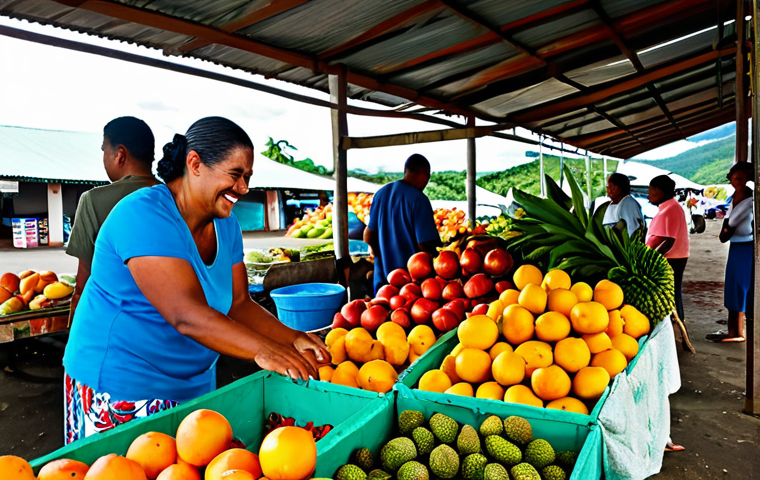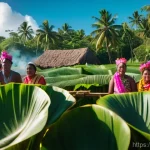I’ve often wondered about the allure of island life, especially when the daily grind feels overwhelming. Fiji, with its turquoise waters and vibrant culture, always tops the list for many, including myself, as a dream escape.
But beyond the postcard-perfect images lies the intricate reality of moving there permanently. It’s not just about packing your bags; it’s about navigating a system designed to shape the nation’s future.
I remember delving deep into the official sites, initially feeling a mix of excitement and overwhelm by the sheer volume of information, yet utterly fascinated by how a small island nation carefully balances welcoming new residents with preserving its unique heritage and economy.
What truly struck me was how adaptable their approach seemed, always subtly shifting with global economic currents and even environmental shifts. It’s a complex dance between opportunity and regulation, reflecting a larger global trend where nations are actively seeking specific skills or investments to drive their growth.
Intrigued by the nuances and recent shifts in this dynamic landscape, I felt compelled to explore what it truly takes to make Fiji your home. Let’s explore this in detail below.
Diving Deeper: Unpacking Fiji’s Immigration Philosophy

When I first started my deep dive into the idea of moving to Fiji, I quickly realized it wasn’t just about finding a picturesque place to escape to; it was about understanding the very fabric of how this nation sees itself and its future.
It genuinely felt like peeling back layers of an onion – at first glance, it’s just a beautiful place, but beneath the surface, there’s a thoughtful, strategic approach to who they welcome onto their shores.
Fiji isn’t simply handing out residency like party favors; they’re looking for individuals who can contribute, not just consume. This deeply resonated with me because it highlights a commitment to sustainable growth and preserving the unique cultural and environmental integrity of the islands.
It’s a philosophy that prioritizes the long-term well-being of the Fijian people and economy, which, to me, makes any potential path to residency feel all the more meaningful and earned.
You aren’t just buying a ticket to paradise; you’re applying to be a part of its ongoing story.
1. Who Fiji Is Calling: The Strategic Welcome Mat
From my research, it became clear that Fiji’s immigration policies are less about open borders and more about a targeted invitation. They’re actively seeking specific skills, investments, and entrepreneurial spirits that align with their national development goals.
It’s not unlike how many developed nations are now tailoring their immigration programs to fill labor gaps or attract innovation. For Fiji, this often means professionals in key sectors like tourism, healthcare, education, or those with a genuine interest in agricultural development and sustainable practices.
I found myself thinking, “Am I a good fit for *their* vision?” rather than just “Is Fiji a good fit for *me*?” This shift in perspective is crucial, as it forces you to consider how your presence might genuinely benefit the local community and economy.
It’s about a symbiotic relationship, where your skills or capital can help Fiji flourish, and in return, you get to experience the unparalleled beauty and warmth of island life.
2. Balancing Growth with Preservation: A Delicate Dance
What truly fascinated me was Fiji’s clear dedication to balancing economic growth with the preservation of its pristine environment and vibrant culture.
You can see this woven into the very fabric of their policies – a clear effort to avoid the pitfalls of unchecked development that have plagued some other island nations.
They want new residents to embrace the “Bula” spirit, to integrate, and to respect the local way of life, rather than merely creating isolated expat enclaves.
This isn’t just about regulations; it’s about a national identity. I’ve often heard stories of other places losing their soul as they globalize, but Fiji seems determined to avoid that.
Their focus on sustainable tourism and responsible investment is a testament to this. It instilled in me a sense of confidence that moving there would mean becoming part of a community that values its heritage deeply, and that’s incredibly appealing.
Weighing Your Options: Pathways to Permanent Residency
The sheer number of pathways available to those looking to make Fiji their home initially seemed a bit overwhelming, but as I dug deeper, I realized each one is designed for a specific type of contributor.
It’s not a one-size-fits-all approach, and that’s actually a good thing. It forces you to carefully consider your own circumstances and how you align with Fiji’s needs.
For me, navigating these various categories felt like piecing together a puzzle, trying to find where my skills and aspirations might best fit into the Fijian landscape.
This isn’t just about ticking boxes; it’s about understanding the commitment each path entails, both financially and in terms of your long-term engagement with the country.
It’s a journey that demands patience and thorough research, but the potential reward – a life in paradise – makes every bit of effort worthwhile.
1. Investment Visas: The Entrepreneur’s Gateway
One of the most prominent pathways I encountered was the investment visa. This is clearly aimed at individuals who are not just looking for a place to retire, but who are willing to inject capital and create opportunities within Fiji.
The thresholds for these investments can vary significantly based on the type of business or sector, but the underlying principle is consistent: contribute to Fiji’s economic growth.
I remember feeling a bit daunted by the figures at first, but then I started looking at it from Fiji’s perspective – they’re essentially inviting partners, not just residents.
This could be anything from developing eco-tourism resorts to agricultural ventures or even manufacturing. The key takeaway for me was that these aren’t passive investments; they often require active participation and a genuine commitment to the success of the enterprise, which can be an incredibly rewarding challenge for the right individual.
2. Skilled Migration and Employment: Filling Essential Gaps
Beyond investment, Fiji also actively seeks skilled professionals to fill gaps in its local workforce. This category often applies to sectors where local expertise might be limited, or where there’s a high demand for specialized skills.
Think healthcare professionals, engineers, IT specialists, and certain niche tourism roles. This path felt more accessible to someone like myself, who might not have millions to invest but possesses a valuable skill set.
The process typically involves securing a job offer from a Fijian employer, which then serves as the foundation for your work permit and eventual pathway to residency.
It requires demonstrating your qualifications and proving that your skills are genuinely needed. I’ve heard stories from expats who successfully navigated this route, emphasizing the importance of networking and having a clear value proposition for potential employers in Fiji.
3. Retirement and Dependent Visas: Embracing a Slower Pace
For those who dream of retiring to the gentle rhythm of island life, Fiji offers specific retirement visa options. These are generally for individuals who can demonstrate a stable, independent income from outside Fiji, ensuring they won’t be a burden on the local economy.
It’s about being self-sufficient and being able to contribute through spending and living within the local economy. And, of course, there are dependent visas for spouses and children of those who qualify for other categories, allowing families to move together.
This truly broadens the appeal, making Fiji a viable option for a wide range of individuals and family units looking for a fresh start or a serene retirement.
The Financial Compass: Understanding Investment and Self-Sufficiency
Navigating the financial landscape of moving to a new country can often feel like trying to read a map in the dark, but in Fiji’s case, while there are clear expectations, there’s also a sense of pragmatism.
My biggest takeaway from looking into the financial requirements wasn’t just about having enough money, but about demonstrating a *sustainable* financial plan.
Fiji wants to ensure that new residents can support themselves and contribute positively to the economy, rather than becoming a drain on public services.
This is a reasonable expectation, I thought, for any country welcoming newcomers. It’s about showing you’ve done your homework and are prepared for the realities of living in a different economic environment.
1. Investment Thresholds: More Than Just a Number
For those considering the investment visa route, the numbers can seem significant, but it’s important to view them not just as a cost, but as a commitment to Fiji’s future.
These investments are typically channeled into specific sectors that the government has identified as crucial for national development, such as tourism, manufacturing, agriculture, or certain service industries.
I’ve seen figures ranging from hundreds of thousands to millions of Fijian dollars, depending on the scale and nature of the proposed venture. It’s not just about depositing funds; it’s about a viable business plan that can create jobs for Fijian nationals and introduce new technologies or services.
From talking to people who’ve gone down this path, the due diligence process is rigorous, and rightfully so. They want to ensure the investment is legitimate and beneficial.
2. Demonstrating Self-Sufficiency: The Income Requirement
For retirement visas or those not entering via a significant investment, demonstrating a reliable, consistent income stream from outside Fiji is paramount.
This ensures you can comfortably support yourself without needing to seek employment locally (unless you’re on a skilled worker visa, of course). I’ve seen varying figures, but generally, it’s about proving a stable pension, investment income, or remote work earnings that meet a certain monthly or annual threshold.
This isn’t just a bureaucratic hurdle; it’s a practical measure to ensure your financial stability in a new country. It means budgeting carefully, understanding the cost of living in Fiji, and having a buffer for unexpected expenses.
3. Comparative Investment Pathways for Permanent Residency
To give you a clearer picture of some of the investment-based avenues, I’ve put together a simplified table. Please note, these figures are indicative and subject to change based on Fiji’s evolving policies.
Always consult official immigration resources or legal professionals for the most current information. This table really helped me conceptualize the different scales of financial commitment required for various paths.
| Investment Category | Minimum Investment Threshold (FJD) | Key Conditions/Focus |
|---|---|---|
| Retirement Visa (Passive Income) | Proof of consistent offshore income (e.g., FJD 50,000+ annually) | Must not seek local employment; demonstrate financial independence. |
| Investor Visa (General) | FJD 250,000 – FJD 1,000,000+ | Investment in approved sectors (tourism, manufacturing, agriculture); creates employment for locals. |
| Investor (Small & Medium Enterprise) | FJD 100,000 – FJD 250,000 | Focus on specific niche businesses that benefit local communities; typically requires active management. |
| Land Development/Real Estate Investment | Varies greatly (often FJD 500,000+) | Specific land development projects, e.g., eco-tourism resorts, residential developments that align with government plans. |
Beyond the Bureaucracy: The Everyday Realities of Island Living
It’s easy to get caught up in the visa applications and financial planning, but what truly matters, once you’re there, is the day-to-day experience. I’ve always believed that true happiness in a new place comes not just from the beautiful scenery, but from how well you adapt to the rhythm of local life.
Fiji offers an incredible lifestyle, but it’s important to temper the postcard fantasies with a healthy dose of reality. Living on an island, especially one in the South Pacific, comes with its own unique set of challenges and charms that are far removed from what many of us are accustomed to in more developed nations.
This isn’t a critique; it’s an observation born from numerous conversations and anecdotal evidence, reminding me that paradise still requires practical living.
1. The “Fiji Time” Mindset: Patience is a Virtue
One of the first things you’ll hear about is “Fiji Time.” This isn’t just a quaint saying; it’s a way of life, and it’s something I quickly learned would require a significant mental adjustment for someone used to the relentless pace of city life.
Appointments might be delayed, services might take longer than expected, and things generally move at a more leisurely pace. At first, this might feel frustrating, but I’ve come to understand it as an invitation to slow down, breathe, and appreciate the present moment.
It’s a reminder that not everything needs to be rushed, and that sometimes, the most important moments are the ones you spend simply being. Embracing “Fiji Time” is, in my opinion, one of the biggest determinants of whether you’ll truly thrive or constantly battle against the current.
2. Cost of Living: Budgeting in Paradise
While some things in Fiji might seem cheaper, such as fresh produce from local markets, other essentials, particularly imported goods, can be surprisingly expensive.
I found myself making mental notes about how my current grocery bill would translate there. Things like specialized electronics, certain types of clothing, or imported processed foods can come with a hefty price tag due to shipping and import duties.
Utilities, especially electricity, can also add up, particularly if you’re heavily reliant on air conditioning. My research consistently pointed to the importance of adapting to local consumption habits – eating more fresh, local seafood and vegetables, and less imported packaged goods.
This isn’t just about saving money; it’s about a healthier, more sustainable lifestyle that truly integrates you into the local economy and food system.
3. Connectivity and Infrastructure: Bridging the Digital Divide
While Fiji has made significant strides in improving its infrastructure, particularly in urban centers like Suva and Nadi, it’s still an island nation.
Internet connectivity, though improving, might not always be as fast or as reliable as you’re used to, especially in more remote areas. Power outages can occur, and road conditions might vary.
This isn’t a deal-breaker, but it’s something to be prepared for, particularly if you’re planning on working remotely or rely heavily on stable utilities.
I envision having backup plans for power and being mindful of my data usage. It’s a small price to pay for living in such a stunning location, but it’s a reality check that ensures your expectations are aligned with what’s on the ground.
Building a Life: Healthcare, Education, and Community Integration
When you’re considering a permanent move, it’s not just about the immediate novelty of a new place; it’s about building a sustainable life there. For me, that meant looking beyond the sunny beaches and delving into the practicalities that truly shape daily existence: healthcare, education for potential families, and perhaps most importantly, how to genuinely integrate into the community.
These are the cornerstones of a stable life, and Fiji, while offering a unique setting, has its own systems that prospective residents need to understand and respect.
My deep dive into these areas gave me a much clearer picture of what a long-term commitment to Fiji would truly entail.
1. Navigating Healthcare in Fiji: Prioritizing Your Well-being
Healthcare is always a primary concern when moving abroad, and Fiji is no exception. While major urban centers like Suva and Nadi have well-equipped public hospitals and a growing number of private clinics, healthcare services in more remote islands can be basic.
From my observations, many expats opt for private health insurance that covers both local treatment and, crucially, medical evacuation to Australia or New Zealand for more complex procedures.
This proactive approach seems to be the norm, and it makes perfect sense for peace of mind. Access to specialized care might require travel, but for general health, the local facilities, especially the private ones, are often more than adequate.
Understanding this upfront is vital for planning your move effectively.
2. Education for Families: Schooling Options and Cultural Context
For families with children, education is a huge factor. Fiji offers a mix of public and private schools, as well as a few international schools, primarily located in and around Suva and Nadi.
The public system follows the Fijian curriculum, which, while robust, may differ significantly from what children are used to if coming from Western countries.
International schools, on the other hand, often follow curricula like the International Baccalaureate (IB) or British/Australian systems, providing a more familiar academic environment and generally smaller class sizes.
However, these come with significant tuition fees. The decision often boils down to budget and desired educational path. My biggest takeaway here was the importance of visiting schools, speaking with current parents, and understanding the cultural nuances of the Fijian education system, as it’s a key part of integrating into the community.
3. Community Integration: Embracing the “Bula” Spirit
This is where the true magic of Fiji lies, in my opinion. The “Bula” spirit isn’t just a greeting; it’s a philosophy of warmth, hospitality, and community.
Successfully integrating into Fijian society means more than just living there; it means embracing this spirit, being open to new experiences, and showing genuine respect for local customs and traditions.
I’ve heard countless stories of expats who found immense joy and belonging by participating in village life, learning a few basic Fijian phrases, joining local clubs, or volunteering.
It’s about stepping out of your comfort zone and engaging with the vibrant local culture. While there’s an expat community, true fulfillment often comes from building bridges with Fijians themselves.
This human connection is, for me, the most compelling reason to consider making Fiji your long-term home.
The Practicalities of the Plunge: Moving Your Life to Paradise
Once the initial excitement of envisioning island life subsides, the daunting reality of logistics sets in. Moving your entire life – your belongings, your finances, and even your pets – across oceans to a new country is no small feat.
It requires meticulous planning, a good dose of patience, and the ability to adapt when things don’t go exactly as planned. From my own experience with moving internationally in the past, I know these practical steps can often be the most stressful, yet they are absolutely critical for a smooth transition.
Thinking through these details beforehand can save you immense headaches and make the first few months in Fiji much more enjoyable.
1. Shipping Your Belongings: Patience and Planning
Deciding what to bring and what to leave behind is a huge decision. Shipping costs can be substantial, and transit times can be long, often several weeks to a few months by sea.
I’ve heard stories of everything from cherished family heirlooms to cars making the journey. It’s crucial to research reputable international movers with experience shipping to Fiji and understand customs regulations and duties for various items.
For some, the cost and hassle of shipping large items might outweigh the benefit, leading them to sell off most of their possessions and start fresh. For me, the strategy would be to prioritize essentials and sentimental items, and then purchase larger furnishings locally.
It’s a balance between comfort and practicality, and often means embracing a more minimalist approach to life.
2. Financial Transfers and Banking: Setting Up Your Funds
One of the first things you’ll need to do upon arrival is set up a local bank account. This is essential for managing daily expenses, paying bills, and receiving any local income.
Major international banks often have a presence in Fiji, or you can opt for local Fijian banks. I learned that transferring large sums of money internationally can involve fees and exchange rate fluctuations, so it’s wise to plan these transfers carefully.
Understanding the local tax system, especially concerning any foreign-earned income or investments, is also paramount. Many expats choose to consult with a financial advisor specializing in international taxation to ensure compliance and optimize their financial situation from the outset.
3. Visa Extensions and Renewals: Staying Compliant
The initial visa you receive might be for a shorter term, often one or two years. It’s absolutely crucial to understand the requirements and timelines for visa extensions and, eventually, permanent residency.
Missing deadlines or failing to provide required documentation can lead to significant stress and even jeopardize your ability to stay in Fiji. My research highlighted the importance of keeping all your paperwork meticulously organized, setting reminders for renewal dates, and if in doubt, seeking professional advice from an immigration consultant or lawyer in Fiji.
Staying compliant with immigration laws is non-negotiable and ensures your long-term dream of living in Fiji remains a reality.
Embracing the Bula Spirit: Thriving in Your New Fijian Home
The practicalities of moving eventually give way to the exciting process of actually living in your new home. This is where the magic truly begins – when the bureaucratic hurdles fade into the background, and you start to weave yourself into the vibrant tapestry of Fijian life.
It’s more than just settling in; it’s about thriving, about allowing the unique rhythm and warmth of the islands to reshape your perspective and enrich your daily existence.
My deepest hope for anyone considering this move is that they don’t just reside in Fiji, but truly become a part of its beating heart, embracing its challenges and reveling in its unparalleled joys.
1. Cultural Immersion: Beyond the Tourist Trail
To truly thrive in Fiji, one must move beyond the curated experiences offered to tourists and actively engage with the local culture. This means trying new foods at local markets, attending village ceremonies if invited, learning a few words of basic Fijian (like “vinaka” for thank you, and of course, “bula!”), and understanding the nuances of respectful interaction.
I’ve heard countless stories from expats who found immense joy and connection by simply being open and curious. Attending a rugby game, joining a local church service, or participating in a community clean-up can open doors to genuine friendships and a deeper appreciation for the Fijian way of life.
It’s about being a guest who genuinely wants to learn and contribute, not just observe.
2. Adapting to the Environment: Climate and Natural Wonders
Living in Fiji means embracing a tropical climate, which comes with its own set of considerations. Humidity, occasional cyclones, and the intense sun are all part of the package.
It’s about learning to live with the environment, not against it – building a home that breathes, dressing appropriately, and understanding the weather patterns.
But alongside these practicalities come the unparalleled natural wonders. The world-class diving, the lush rainforests, the pristine beaches, and the incredibly diverse marine life become your backyard.
Thriving means taking advantage of these opportunities for adventure and relaxation, connecting with nature in a way that’s often impossible in urban settings.
It’s a constant reminder of the incredible beauty that surrounds you daily.
3. Giving Back and Contributing: Becoming Part of the Future
Finally, true integration often comes with finding ways to give back to your new community. This isn’t necessarily about grand gestures, but about small, consistent contributions.
It could be volunteering your time or skills to local charities, supporting local businesses, or simply being a considerate and responsible resident. Fiji is a developing nation, and every positive contribution, no matter how small, can make a difference.
From what I’ve gathered, showing a genuine desire to be a positive force in the community is deeply appreciated and truly solidifies your place as a valued member of Fijian society.
It transforms the act of moving from a personal pursuit into a shared journey, fostering a sense of belonging that few other places can offer.
Concluding Thoughts
My journey into understanding Fiji’s immigration philosophy has been far more than a research project; it’s been a window into the soul of a nation. It became clear that making Fiji your home isn’t just about obtaining a visa; it’s about aligning with a vision, embracing a unique pace of life, and finding your place within a warm, welcoming community.
The path requires patience, financial prudence, and a genuine desire to integrate, but the potential rewards—a life lived in harmony with nature and an incredible culture—are immeasurable.
It’s an application to be part of a paradise that values its heritage as much as its future.
Useful Information
1. Always verify the latest immigration policies and requirements directly from the official Fiji Immigration Department website or through a registered immigration consultant in Fiji. Policies can and do change.
2. Connect with existing expat communities on social media platforms or forums. Their real-world experiences offer invaluable insights into daily life, challenges, and local resources.
3. Plan a reconnaissance trip if possible. Spending a few weeks living like a local, away from resort areas, can give you a much clearer picture of daily realities and help manage expectations.
4. Consult with a Fijian lawyer specializing in property and immigration law before making any significant investments or long-term commitments. Due diligence is paramount.
5. Start learning basic Fijian phrases. While English is widely spoken, making an effort to speak the local language is a sign of respect and can significantly enhance your integration experience.
Key Takeaways
Moving to Fiji is a purposeful decision, reflecting the nation’s selective immigration approach focused on attracting individuals who can contribute meaningfully to its sustainable growth.
Pathways to residency, whether through investment, skilled migration, or retirement, demand financial self-sufficiency and active engagement. Beyond the formal processes, successful integration hinges on embracing “Fiji Time,” adapting to local living costs and infrastructure, and genuinely immersing yourself in the “Bula” spirit, fostering community connections and respecting cultural nuances.
This journey is about finding your place within Fiji’s story, not just living on its shores.
Frequently Asked Questions (FAQ) 📖
Q: When you talk about the “intricate reality” of moving to Fiji, what’s the biggest hurdle people typically face when navigating the official system for permanent residency, beyond just meeting the basic criteria?
A: Oh, that’s a brilliant question, and it really cuts to the core of it. From my own digging and conversations with folks who’ve actually made the leap, the biggest hurdle isn’t usually meeting the stated criteria – like the investment threshold for a retirement visa, or having a specific skill for a work permit.
No, the real challenge, the one that often blindsides people, is the interpretive and somewhat fluid nature of the regulations, combined with the sheer patience required for the administrative process.
It’s not just ticking boxes; it’s about demonstrating your genuine commitment to Fiji’s future, often in ways that aren’t explicitly written down. I remember one fellow I chatted with who’d applied for a retirement visa, thinking he had all his ducks in a row with the required FJD investment.
He was completely thrown by the extensive background checks and interviews that felt less about verifying documents and more about assessing his “fit” for the community and economy.
It’s a bit like they’re looking for partners, not just residents. And honestly, the “Fiji time” that’s charming on holiday can become utterly exasperating when you’re waiting on crucial paperwork.
It truly tests your resilience, making you realize it’s a marathon, not a sprint, and sometimes the finish line keeps subtly shifting.
Q: Beyond the initial excitement, what are the most common financial realities or unexpected costs people encounter when trying to establish a permanent life in Fiji, especially when comparing it to their previous Western lifestyle?
A: This is where the dream often meets a splash of cold, salty reality. Everyone goes in thinking “island life, must be cheap!” And in some ways, yes – fresh local produce at the market is incredibly affordable, and a bus ride is pennies.
But the unexpected costs, the ones that really pinch, are imported goods and services, and the often-overlooked expenses of maintaining a modern lifestyle in a developing nation.
I was genuinely surprised by the price of things you take for granted back home: good quality cheese, imported wines, specific car parts, or even just reliable, high-speed internet.
These things can be exorbitant because of shipping costs and duties. Then there’s the hidden cost of “fixing” things – reliable electricians or plumbers might be fewer and further between, and their services, when available, can be surprisingly expensive, especially if they’re dealing with non-standard issues.
You might save on daily bread, but you could easily blow your budget on a new fridge if yours gives out. It truly reshapes your understanding of value; you learn to appreciate local alternatives quickly, or simply do without.
Q: You mentioned the balance between “welcoming new residents with preserving its unique heritage and economy.” How does this play out in the day-to-day experience of a new resident, particularly regarding social integration and contributing to the community?
A: That’s a crucial point, and it’s deeply woven into the fabric of life there. It really translates into a fascinating dynamic where social integration isn’t just about being friendly; it’s about a conscious effort to respect and contribute to the existing community, often on their terms, not yours.
You see, Fiji isn’t a blank slate; it’s got a rich, vibrant culture and a strong communal spirit that newcomers are expected to adapt to, rather than the other way around.
My biggest takeaway was that you can’t just arrive and expect things to operate with the same individualistic, efficiency-driven mindset you might be used to in a Western city.
Whether it’s participating in village events, understanding the importance of traditional protocols (like sevusevu, the kava ceremony), or simply slowing down to connect on a personal level before getting to business, these are all non-negotiable aspects of genuine integration.
You’ll find that truly being “accepted” goes far beyond simply living there; it means respecting the “Bula” spirit, contributing to local initiatives, and genuinely valuing their way of life, even when it might seem inefficient to your Western eyes.
It’s a beautiful exchange, but it demands an open heart and a willingness to learn and adapt constantly.
📚 References
Wikipedia Encyclopedia
구글 검색 결과
구글 검색 결과
구글 검색 결과
구글 검색 결과
구글 검색 결과






